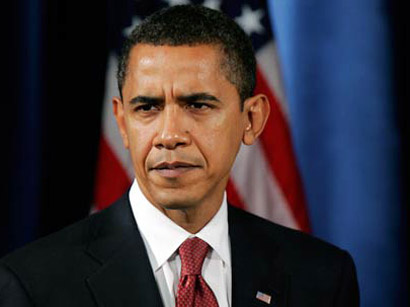Obama to Iran' skeptics - deal will prevent Tehran from acquiring nuclear weapons

By Sara Rajabova
The recent Lausanne agreement which was reached between Iran and world powers shed a light on a decade-old nuclear dispute. For well over a decade Iran has been at odds with western powers over its nuclear ambitions and allegations it sought to develop a nuclear bomb.
While many states welcomed the framework agreement with Iran, Israel said it considers such a deal a threat to its existence, and called on the United States to seek a better deal with Tehran.
Israel, it appears, will attempt to heavily influence U.S. lawmakers as to oppose the nuclear deal and prevent a final agreement from being drawn with Iran coming this summer.
Israeli Prime Minister Benjamin Netanyahu said he has spoken with both Democrats and Republicans in Congress - nearly two thirds of House of Representatives members and a similar number in the U.S. Senate - about the Iran nuclear issue, Reuters reported.
He still believes that a deal with Iran will give Tehran "a free path to the bomb."
Netanyahu warned that if implemented, the agreement on Iran’s nuclear program could trigger a nuclear arms race in the Middle East region.
"These agreements have caused great concern among the Sunni states in the region. One of the tragic results of this agreement, if implemented, could become a nuclear arms race in the Middle East. It will become a nightmare for the whole world," Netanyahu said in an interview with US television channel NBC.
Though, the Israeli PM's words are in line with Tel Aviv’s negative stance toward Iran, claims that such a deal could trigger a nuclear arm race in the region could indeed be justified.
The region’s most ambitious Sunni states, namely Saudi Arabia and Turkey, which are less than satisfied with Shia Iran’s growing role in the region, are not willing to stay behind Tehran in this regard. These powers are also strongly determined to build peaceful nuclear energy in their respective countries.
An arm race in the Middle East could lead to dangerous developments in the region, especially in view of existing tensions.
Meanwhile, U.S. President Barack Obama assured that the agreement signed in Lausanne on April 2, is the best way to prevent Iran from acquiring nuclear weapons.
As expected, Obama faces strong skepticism both at home and from its traditional allies following the framework agreement with Iran.
The U.S. president attempted to comfort very worried Israelis saying that the U.S. stands by its traditional ally Israel, if it were to be attacked by any state.
Meanwhile, he defended the Lausanne agreement saying "There is no formula, there is no option, to prevent Iran from getting a nuclear weapon that will be more effective than the diplomatic initiative and framework that we put forward - and that’s demonstrable," Obama said in an interview with the New York Times on April 5.
Iran, which has been considerably hurt by international sanctions over the past years, said it will not abandon its obligations if world powers follow the terms of accord.
Iran's President, Hassan Rouhani, has vowed it will abide by the terms of the preliminary nuclear agreement it signed with six world powers, while they comply with their commitments.
However, despite the long-awaited agreement that is expected to stop the economic blockade of Iran, the country’s leadership is also facing domestic pressure by hardliners.
As it is in the U.S., the Iranian presidential administration also has to eliminate the skepticism of conservative critics over the framework agreement.
The Iranian parliament’s National Security and Foreign Policy Commission has invited Iran’s nuclear negotiators to attend one of the its sessions in order to provide reports on the recent Lausanne agreement.
However, Iranian parliament speaker Ali Larijani, who welcomed the Lausanne framework agreement, urged MPs to acquire full knowledge of the matter and consult experts before they address the nuclear case.
Under Lausanne agreement's terms, Iran must slash its stockpile of enriched uranium that could be used in a nuclear weapon and cut by more than two-thirds the number of the centrifuges that could be used to make more.
In return, UN sanctions and separate measures imposed unilaterally by the U.S. and EU will be gradually suspended as the global nuclear watchdog, the International Atomic Energy Agency, confirms Iranian compliance.
--
Sara Rajabova is AzerNews’ staff journalist, follow her on
Twitter: @SaraRajabova
Follow us on Twitter @AzerNewsAz
Here we are to serve you with news right now. It does not cost much, but worth your attention.
Choose to support open, independent, quality journalism and subscribe on a monthly basis.
By subscribing to our online newspaper, you can have full digital access to all news, analysis, and much more.
You can also follow AzerNEWS on Twitter @AzerNewsAz or Facebook @AzerNewsNewspaper
Thank you!
